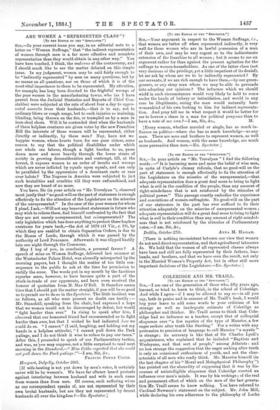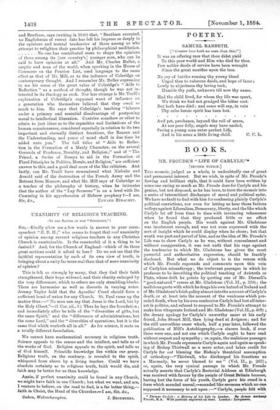COLERIDGE AND MR. TRAILL.
[To THE EDITOR OF THE "SPECTATOR."] am one of the generation of those who, fifty years ago, learned, or tried to learn to think, in the school of Coleridge. And while I agree—if I may be allowed to say so—in all you say, both in praise and in censure of Mr. Traill's book, I would beg your leave to add some words to your criticism of his strange as well as inadequate estimate of Coleridge as philosopher and thinker. Mr. Traill seems to think that Cole- ridge had no influence as a teacher, except that of colloquial eloquence over " a few mystics of the type of Maurice, a few eager seekers after truth like Sterling." For a writer with any pretension to precision of language to call Maurice " a mystic " is strange ; its accuracy is like that of Sir Charles Lyell's acquaintance, who explained that he included "Baptists and Wesleyans, and that sort of people," among Atheists : and no less strange the suggestion that the eager seeking after truth is only an occasional enthusiasm of youth, and not the char- acteristic of all men who really think. Mr. Maurice himself (in the last chapter of his "Moral and Metaphysical Philosophy ") has pointed out the absurdity of supposing that it was by dis- courses of unintelligible eloquence that Coleridge exerted an influence over men's minds. It was by his writings ; of the real and permanent effect of which on the men of the last genera- tion Mr. Traill seems to know nothing. You have referred to Cardinal Newman's statement on the subject. Mr. John Mill, while declaring his own adherence to the philosophy of Locke
and Bentham, says (writing in 1840) that, " Bentham excepted, no Englishman of recent date has left his impress so deeply in the opinions and mental tendencies of those among us who attempt to enlighten their practice by philosophical meditation.
No one has contributed more to shape the opinions of those among its [our country's] younger men, who can be said to have opinions at all." And Mr. Charles Buller, a sceptic and man of the world, when speaking in the House of Commons on the Pension List, used language to the same effect as that of Mr. Mill, as to the influence of Coleridge on contemporary thought. And I remember Mr. Buller expressing to me his sense of the great value of Coleridge's " Aids to Reflection " as a method of thought, though he was not in- terested in its theology as such. Nor less strange is Mr. Traill's explanation of Coleridge's supposed want of influence on a generation who themselves believed that they owed so much to him. He says that Coleridge's teaching "labours under a primary and essential disadvantage of postponing moral to intellectual liberation. Contrive somehow or other to attain to just ideas as to the capacities and limitations of the human consciousness, considered especially in relation to its two important and eternally distinct functions, the Reason and the Understanding, and peace of mind shall in due time be added unto you." The full titles of " Aids to Reflec- tion in the Formation of a Manly Character, on the several Grounds of Prudence, Morality, and Religion ;" and of " The Friend, a Series of Essays to aid in the Formation of Fixed Principles in Politics, Morals, and Religion," are sufficient answer to this, and a good deal more of the like criticism. And lastly, can Mr. Trail have remembered what Niebuhr and Arnold said of the destruction of the French Army and the Retreat from Moscow, and what Mr. Mill says of Coleridge as a teacher of the philosophy of history, when he intimates that the author of the " Lay Sermons" is on a level with Dr. Cumming in his apprehension of Hebrew prophecy P—I am,















































 Previous page
Previous page